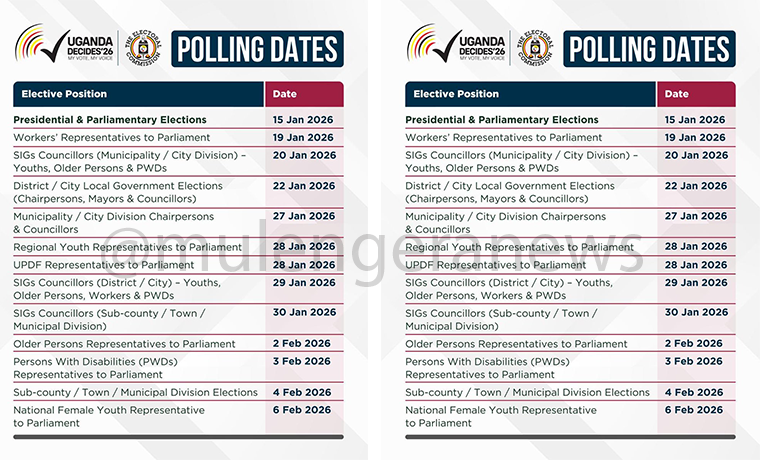By John V Sserwaniko
On 9th September 2015, newly appointed UNRA ED Allen Kagina met BoD members for the first time and presented to them her vision for the roads Authority she envisaged. From her submissions it was clear there was need to restore public trust and polish the UNRA image following the acrimonious departure of the old team that saw Kagina’s predecessor Eng Sebuga Kimeze being accused of many things including failing to prevent the Katosi scandal. That wasn’t all. Kimeze and his team were also badly indicted in the Bamugemereire UNRA report which has since been severally challenged in courts of law. Kagina clearly came off as a CEO that was determined to, within a shortest time, re-create the UNRA image. She repeatedly pledged to her bosses, the BoD members, that she represented a change that would see the Authority employees shift their mindset from “the traditional civil service to corporate culture.” She also promised to save lots of money, eliminate corruption, reduce per unit cost (money spent per km) and increase output. For her ambitious vision to come to fruition, Kagina asked the BoD to approve the new staffing structure and the salary enhancement scheme she was proposing. The BoD members were impressed, just like the MPs among the many other groups she met and marketed her vision to revitalize UNRA.

HER DEMANDS/PROMISES;
She proposed, and the BoD agreed, that the ED’s salary be increased from Shs12m her predecessor earned per month to Shs45m which she currently earns. She proposed and was granted permission to increase the Directorates from mere 5 to 9 there is today. The BoD, that was full of goodwill partly cultivated by her sometimes exaggerated performance at URA, also cleared the increment of the 9 Directors’ salary to Shs25m against the mere Shs8.5m which their predecessors earned. The number of managers was also increased and their pay was enhanced from their predecessors’ mere Shs6m to Shs22m per month. This restructuring (growing the UNRA staffing strength from 800 to over 1700 employees) would come at a cost and it indeed saw the annual wage bill grow from mere Shs23.5bn of the Kimeze/Sebanakitta era to today’s Shs150bn per year. This also covers operational costs (things like allowances, air travel, fuel, medical insurance for the staff & utility bills).
COST PER KM;
On the per unit cost (money spent per km), Kagina assured the BoD that if her request for restructuring was granted, she would reduce the $1m that was being spent per km to just $0.5m within 3 years. She promised that within her first three years (which have already elapsed), she would annually save over Shs200bn that was being lost in procurement corruption practices, price variations and falsified compensation claims. That she would stop outsourcing aspects like road designing plus supervision (and have it done in-house) and thereby annually save Shs20bn for the Authority. That as a result of all these reforms (and after the first three years), she would grow the length of roads upgraded (murram to tarmac) from her predecessors’ 250km annually to 1,000km. She pledged that, because she was going to eliminate corruption and connivance between contractors and project supervising consultants, the life span of paved/tarmacked roads would (within her first 3 years) increase from 5 to 10 years before resealing. Kagina also showed the BoD how she would annually save a total of Shs101.5bn by making basic reforms at UNRA: this includes the Shs17bn she said she would save by ending the practice of contracting design consultants. She indeed ended outsourcing and started doing the job in-house and the results have been calamitous as we shall later show in this special report. She further pledged that mere elimination of external land compensation consultants would annually save Shs10bn for UNRA. Her thinking was that, once adequately remunerated, the internal staffers would do this work at no extra fee. She submitted that by creating a strong Legal Directorate (ably headed by Mary Kutesa Kamuli) and eliminating reliance on external lawyers, she would annually save Shs6bn. By returning the task of works’ supervision back to UNRA (as opposed to outsourcing it), Kagina assured the BoD Shs10bn would be annually saved. She would stop the hiring of consultants to carry out technical audits and return the function to UNRA and thereby save Shs5bn annually. She claimed by stamping out the inefficiency and corruption imbedded in internal corruption, she would annually save Shs30bn for the Authority.

HAS SHE LIVED UP TO EXPECTATIONS?
Our observation is no and we shall make the following submission to illustrate our point. She said she would return UNRA into a world class organization based on corporate values of transparency and integrity. The promised integrity only exists on paper but the practice is totally different. Things one would least expect have been happening at Kagina’s UNRA including some staffers spying on their own organization for pay. This is how high-spending Dott Services directors have always been able to access every confidential document and it’s what they have been using to deflate Kagina. They have effectively demystified the myth of invincibility she had created over the years both in public media and among MPs and CSOs. That they could successfully manipulate her own staff to the extent of spying on her for their own benefit is proof that the corporate values of integrity she sought to inculcate haven’t as yet sunk deeply enough. And indeed, using this dubiously-obtained confidential information, the Dott Services guys have been able to antagonize her with the President who has been her strongest ally, promoter and defender in her entire career life. To an extent, they also managed to antagonize her with the BoD and some UNRA Directors. And talking of output; Kagina has fallen short of her own commitments. She promised to annually upgrade 1,000 kms of road from murram to tarmac, something in which she has registered glaring failure. Whereas her predecessors delivered 250kms per year, Kagina’s report card for the last three years miserably reads as follows: 156kms in FY2014/15, 120kms in FY2015/16 & 100kms in FY2016/17. UNRA insiders fear that this rating could even worsen in the FY2017/18. The pre-Kagina UNRA had in 7 years delivered/upgraded 1,404kms making the annual average of 200kms. They rehabilitated/reconstructed 1,135kms averaging at 162kms per year. In 7 years-and with less funding-they built or replaced 13 bridges and completed designs for 2,674kms (averaging to 382kms per year). She inherited 985kms of roads being upgraded at the time of taking office. There was also another 488kms of old tarmac under rehabilitation. 27 bridges were under construction and another 1,200kms worth of roads were being designed. One wonders why, despite inheriting such a healthy portfolio of running and completed road projects, UNRA’s Kagina era performance has only declined rather than improving. UNRA’s budget too is much more than it was 3 years ago when she first took charge. This is how it has been increasing under Kagina’s tenure: Shs1.2trillion in FY2014/15, Shs11.8trn in FY 2015/16 & now Shs2.8trn for the FY2017/18. This brings the total allocation Kagina has handled in her first three FYs so far to Shs5.6trn.
FORCE ACCOUNT;
This refers to using one’s own internal staff and equipment to do road construction and maintenance as opposed to outsourcing. Kagina’s predecessors practiced the latter and the benefit with outsourcing is that you circumvent the government lengthy bureaucratic procurement procedures which catch up with every road project decision you make. Whereas as UNRA, you must follow all the procedures to procure even the least spare part for a grader, a private contractor buys whenever and wherever he chooses in a manner that saves time and enhances efficiency. That largely is the rationale for outsourcing. It’s also consistent with Museveni’s vision of growing the private sector and (being an MDA that is allocated a significant slice of the national budget), UNRA has an obligation to support the private sector by outsourcing some of these things to them. It’s also important for tax base widening because whatever income they make, the private contractors and consultants pay taxes. By insisting on force accounting, Kagina has inadvertently constrained her friend Doris Akol’s capability to meet her revenue targets to the chagrin of the President. Many tax-paying entities that lived off UNRA are now in chaos because of the Force Accounting approach Kagina re-introduced resulting into road designs, road works and supervision not being outsourced anymore. Some of the projects undertaken on force accounting so far include the upgrading of 15km Garuga road from murram to tarmac. Generally speaking, the implementation of force account has been slower than anticipated because it requires higher staff competence and experience levels among UNRA core engineering employees than Kagina expected. In the learning process, a lot of mistakes have had to be made and thereby slowing progress. Yet would-be experienced core UNRA engineering employees were all purged as Kagina insisted on starting on a new page. Consequently, the total of Shs50bn she promised to save annually as a result of force account practices is yet to be realized. She argued back then that outsourcing was wasteful and unnecessary. Desire to circumvent bureaucratic delays that are synonymous with government procurement processes explains why globally not many road authorities work that way (force account). In our part of Africa, it’s Ethiopia that has always practiced force account but it’s currently being scrutinized on grounds that “it’s deceptively cheaper” yet in actual sense it isn’t when you factor in time lost in government bureaucracy. Insiders say the difficulties associated with her policy reversal (from outsourcing to force account) partly explain why Kagina’s promise to annually upgrade 1,000km against her predecessors’ 250km has largely remained a pipe dream. Her annual average in the last three years has barely exceeded 100kms notwithstanding the increased wage bill and operational expenses (Shs150bn). By insisting on force account, Kagina might have been well-intentioned but the results haven’t been as rosy as anticipated.
DONOR FATIGUE;
There are a couple of groups that are disappointed and developed indifference towards the way the UNRA assignment has demystified Kagina including the donor community (like the EU) and generally the sector development partners (e.g. AfDB, WB etc). AfDB is said to have become very disappointed with the way Kagina fought with Dott Services on the Rukungiri-Kihihi-Ishaka road project they were funding. One of the projects that illustrate development partner indifference is North-East Road Assessment Management Program (NERAMP) whose failure to take off has caused the WB to re-think their relationship with UNRA for as long as Kagina remains ED. NERAMP was to initially benefit the 250km economic corridor that runs through Tororo-Mbale-Soroti-Lira-Kamdin. It was a World Bank-funded project worth $350m and the idea was to build UNRA’s financial capacity to engage contractors that would build and maintain roads for 5-10 years. This would ensure the roads don’t break down regularly (like we have seen in the past few days). This financing commitment between WB and GoU/Finance Ministry was signed in 2014 and today, four years later, the project has never taken off. “It’s a loan and interest is being generated and paid by the Ugandan taxpayers simply because the UNRA ED is overwhelmed with many things including wars with some contractors and the project can’t start,” furiously ranted a top finance ministry official. “We expected a lot of efficiency at UNRA under her tenure but we are very disappointed and the donors no longer line up competing to fund projects at UNRA which is the clear proof of how indifferent they have become towards the sector.” Insisting that the EU and AfDB are equally disinterested in Kagina-led UNRA, the Finance Ministry source added that: “Those guys treasured UNRA. It was always one of their best benchmarking roads authority in the region and a mere rumor that its being phased out to strengthen the Works Ministry would by now have prompted them to seek audience with the H/E to protest. These days they don’t care anymore. Kagina’s leadership style has made them re-think their relationship with us regarding UNRA.” The source added that the development partners consider Kagina to be too indifferent and difficult to access unlike her predecessors. “Her aloofness has gradually eroded their enthusiasm towards the sector and it’s no longer top on their agenda of areas they want to partner with GoU,” an MP said concurring with the Finance Ministry official.

KIBUYE-BUSEGA;
Under Eng John Byabagambi’s political supervision, the old UNRA got the Exim Bank of China agree to fund the ($180m) project works on this road and the deal was concluded in 2014 shortly before Kagina came into the picture. Byabagambi’s plan was to add this job to CCCC whose Kampala-Entebbe Express Highway was meant to link up to it to further decongest that part of Kampala. Byabagambi’s concern was on the intersection feature getting the two roads linked up to comprehensively decongest the traffic flow. The disagreement that eventually cost Byabagambi his juicy post, was that Kagina objected to giving CCCC the job automatically without advertising. Byabagambi felt this would unnecessarily lead to lengthy procurement processes. In the end he was accused of having been compromised by CCCC. He subsequently was relegated to the less prolific docket as Karamoja Minister. His supporters felt he was paying the price for standing up to Kagina. Consequently, the GoU objective in simultaneously borrowing money for both Entebbe Expressway and Kibuye-Busega may not be realized as the two aren’t going to be delivered at the same time. This complicates the traffic-reducing intersection points that had been planned.
MUBENDE-KAKUMIRO;
Shortly before Kagina became ED, this road project was awarded by her predecessors to Colin, the Turkish construction company in 2014. This was after a very competitive bidding process. When she became ED, Kagina cancelled the contract and kicked out the Turkish. Her reasoning was this was necessary because complaints were too many from other bidders. The Turkish firm became too frustrated and left the Ugandan market. She eventually re-tendered it to a Chinese firm CCCC at a contract price that was $150m higher than what the Turkish had charged. It’s a 90km road and the Kagina team justified this additional $150m on grounds that the surfacing of the road would now be different from what Colin would have delivered. But there are concerns inside UNRA that the surfacing they went for, in justifying the additional $150m, isn’t appropriate for the traffic anticipated on that road. The Turkish firm executives tried to meet the President to report this clear extra loss by the GoU and when they failed to get audience with the big man, they angrily quit Uganda having concluded they would never fairly win any jobs as long as Kagina was ED.


THE OIL ROADS;
These have just been tendered out and the problem is on the cost. Whereas under the old UNRA management, the unit cost (cost per km) averaged at around $0.7m, the Kagina-led UNRA management tendered out the oil roads at a cost way higher. Work that was awarded to CCCC will cost $2.7m per km and $2.3m per km for the case of the roads awarded to CCECC (this badly contradicts Kagina’s own pledge to the BoD that within 3 years she would bring the unit cost to $0.5m). The official Kagina justification for these clearly very expensive tenders (to CCECC & CCCC) is that the two firms offered to go into pre-financing arrangements. This means the contractor starts work using his own money and gets reimbursed in the subsequent financial year when the contracting Authority (UNRA in this case) gets funding through the national budget. This decision by Kagina left many UNRA insiders aggrieved on grounds that whereas pre-financing is good and okay, the ED overlooked other would-be cheaper options including locally borrowing from our commercial banks. “It would still be much cheaper because the interest rate at which banks lend government for infrastructure projects are well known and would ensure better value for money for the taxpayer than favoring the two Chinese companies under the guise of pre-financing. One day someone will have to answer for this deliberate negligence and betrayal to the taxpayer,” ranted a UNRA insider. The same source clarified that: “This is not to imply that Allen is corrupt. Not at all because there is no such evidence. She is well-meaning but some people are always exploiting her inexperience in this very technical road construction sector to manipulate and lead her into wrong decisions. Otherwise she always has good motives except that she is too suspicious of the people she doesn’t know and in the process she always misses out on good advice.” There are also concerns regarding other pre-financing arrangements for road works in mostly North Eastern part of Uganda in the Kagina era. Questions are quietly being asked in the UNRA corridors whether sufficient attention is being paid to ensuring there is value for money for the taxpayers who primarily (theoretically) are the ultimate bosses of Allen Kagina just like they are for other holders of public office.

K’LA NORTHERN BYPASS;
The works originally started in 2014 and was to last just 2.5 years but it’s now slated to be handed over in 2021 largely because of the authorities’ insistence to contract Motal Engil, a very inept contractor from Portugal. SBI had bided for the same work but the Ugandan Mafia ensured it went to Motal Engil at a cost that was Euros10m higher than the price SBI had quoted. The Euros65m road is a grant from the EU and Motal Engil took the road at Euros10m higher because it had godfathers in the Finance Ministry who insisted the Portuguese had to get the job. The EU always works that way: insisting on having a national authorizing office housed at the Finance Ministry whose concerned officials are always empowered to have a higher say than UNRA itself. The problem on this road project is twofold: one its completion has been/will continue to be unduly prolonged. The other disturbing development is that the “Grade-Separated-Junctions” (a very important traffic mitigation feature) that were originally designed to be part of the road, have since been removed and yet the cost hasn’t been accordingly adjusted. Away from the financial loss, the removal of the ‘Grade Separated Junctions means the original objective of significant jam-reduction won’t be achieved to the levels the original road planners and designers anticipated. Kagina’s UNRA management, that is clearly not culpable on this, should ideally be out running to Parliament, IGG and elsewhere (or even the President) raising a red flag but they haven’t. Why? They are simply overwhelmed by the task at hand that has turned out much harder than they expected.
KANONI-SEMBABULE;
This road project began in 2014 and was meant to last for three years only but today, almost 5 years later, only 40% has been completed largely because of poor contract management by the Kagina-led team at UNRA. Efficient contract management requires high levels of competence and experience which Kagina isn’t privileged to have to the levels that her predecessors Sebanakitta and Sebuga enjoyed as EDs at UNRA. She simply doesn’t have the profile, quality and experience of engineers her predecessors had at their disposal. She purged many of them on merely suspecting them to be crooks and overlooked the fact that it takes years to build that profile of engineers and technical know-how. Kanoni-Sembabule is being done by China Railway No.3. There are other road projects whose completion continues to be delayed because of Kagina’s decision (actively backed by Katuntu-led COSASE MPs) to remove land compensation funds from the total contract sum.

This is something the old UNRA management used to do and the rationale behind it was that this way you make PAPs’ compensation cheaper, faster and less contested. When they know its government handling land compensation, many of the speculators who eventually become PAPs act very unreasonably in many ways including suing government unnecessarily because they know that (because of the political convenience requiring urgent delivery of certain roads) the GoU will subsequently give in to their demands. There is less incentive for the same speculative PAPs to engage in such dubious practices when they know it’s the private contractor handling land compensation. According to UNRA insiders, currently at least 7 priority road projects have been unduly prolonged because of PAP-related disputes. Examples include Kanoni-Sembabule, Lumino-Musito, Gulu-Oluyo etc. Kagina may not be blamed much for this because this was a decision that was largely imposed on her by Parliament when Abdul Katuntu’s COSASE committee directed revision of all these contract prices and in the end it appeared like they had saved Shs35bn for the taxpayer. Whereas the decision seemed politically correct and exciting, on the UNRA’s side it has resulted into delays as compensation negotiations have since become more complicated because speculators always like to squeeze the government harder than they would a private contractor.

K’LA-ENTEBBE EXPRESS;
This we picked directly from reliable State House sources that disclosed to us that the H/E recently got intelligence information that Kagina, who is desperate to have her tenure associated with a major road project in order to silence critics, has no problem commissioning this road before it’s sufficiently ready. “It’s important that something mega is delivered within the life of her first contract which ends later this year. That’s very good for her PR and for justification in case she is given a new contract,” said a knowledgeable source. “That [Express] project will at earliest have substantial completion in November 2018 but the UNRA top management is under temptation to commission it even earlier.” The vastly knowledgeable State House source further explained that: “As part of the original contract, there must be the operations and management contractor before that road is commissioned for 15 years. And the WB and IFC were to be hired as the transaction advisors in hiring the O&M contractor. That is how the Chinese money [loan] was supposed to be collected and paid back in record time. That was the deal with the Chinese funders and there is already nervousness about that breach by UNRA.” The same source added that the CCCC top executives are already uncomfortable dealing with Kagina and have been reporting to the President as much through the well established diplomatic channels. “She rarely pays them on time and they are too bitter learning of money being returned to the Finance Ministry instead of paying them. What makes it worse is that they can’t even access her [Kagina] as regularly as they would like to. Consequently many things she would be administratively addressing directly end up coming to the President and that’s not good for her as the UNRA CEO,” further explained the influential State House official. For comments, call/text/whatsapp us on 0703164755!





























